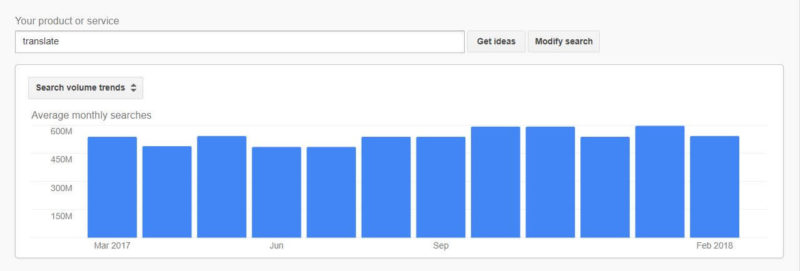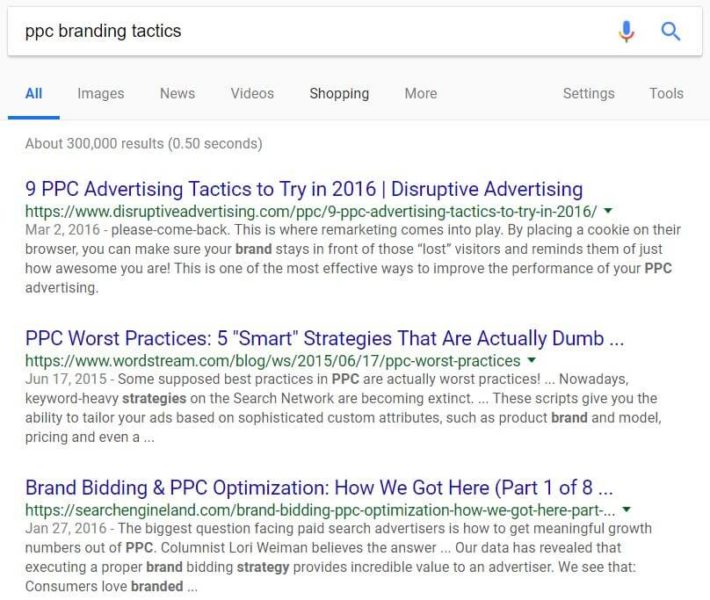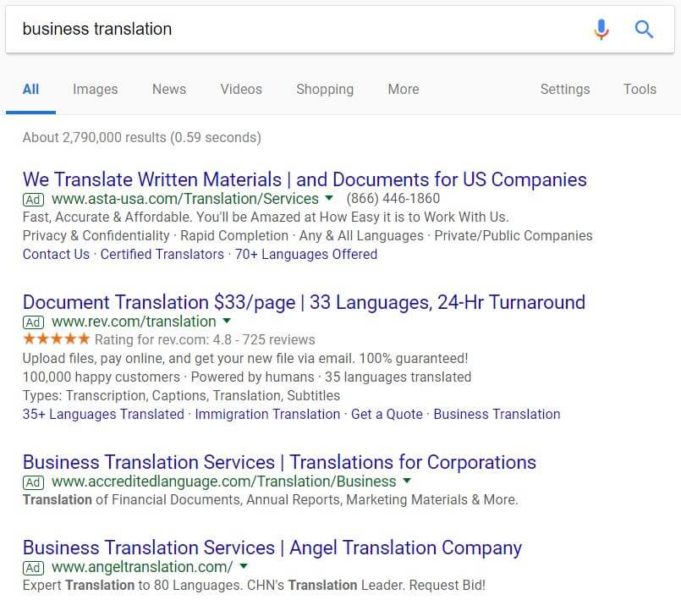Intent-based keyword research: Let Google be your guide
Contributor Jacob Baadsgaard takes a look at why intent is an important part of keyword research and explains how to use Google to guide your SEM and SEO keyword strategies so you're not losing time or money.

Whether paid or organic, when it comes to search marketing, keywords are king.
Good keyword research is at the heart of any successful search marketing campaign, so it pays to get it right from the get-go.
Good keyword research, however, isn’t just about search volume, competition level, suggested bids or any of the other metrics you see in a keyword research tool like Google’s keyword planner.
While all of these metrics are helpful, the most important trait of any keyword is the intent behind it.
From a data perspective, a keyword can look like a perfect fit, but if most of the searches related to a term aren’t related to your business, that keyword probably isn’t worth your time or money.
Unfortunately, Google’s keyword planner doesn’t tell you a lot about the intent behind a keyword. But that doesn’t mean you have to guess. Google can still tell you a lot about the intent behind a keyword; you just have to know where to look.
In this article, we’ll take a look at why intent is such an important part of keyword research, how to get at the intent behind a keyword and ways to use intent to guide your search engine marketing (SEM) and search engine optimization (SEO) keyword strategies.
To begin, let’s start by taking a look at how the intent behind a keyword can affect your SEM and SEO efforts.
Intent and SEM
The easiest way to demonstrate the importance of intent in search marketing is to look at a search engine marketing example.
Why? With SEM, you pay for every click, so if you’re targeting the wrong intent, you can waste a lot of money… fast!
For example, one of my company’s clients offers business translation services (documents, international deals and so on). During our initial audit of their accounts, I noticed something interesting: They were bidding on the keyword “translate.”
At first glance, this keyword seems to make sense. Their business is all about translation, so “translate” seems like a no-brainer keyword, especially when the keyword gets hundreds of millions of searches every month.
Not surprisingly, bidding on “translate” had won them a lot of clicks: $150,000 worth of clicks, to be precise.
This would have been great, except for one little thing: Those clicks didn’t turn into sales.
Despite the fact this keyword and many others looked relevant to their business and had great search volume, their SEM campaigns were a colossal waste of money. The intent behind their keywords was wrong.
While “translate” is a great match for what this business does, most people who use the word “translate” in an online search aren’t looking for business translation services. In other words, the keyword was right, but the intent was wrong, and the end result was $150,000 down the drain.
Intent and SEO
Intent isn’t just an SEM problem, though.
For example, someone in my company recently wrote an article focused on pay-per-click (PPC) tactics. It was a cheeky piece that used Wes Craven’s Freddie Krueger slasher film as a framework for discussing why different PPC branding tactics were so effective.
Almost overnight, traffic to our blog increased 497 percent. It was our first real blogging breakthrough!
Which would have been great… except that no one was converting.
Our traffic wasn’t finding us because they were not searching for things like “PPC branding” or “branding tactics,” they were searching for “freddy krueger tactics.”
Somehow, we had ended up as the #1 article for “freddy krueger tactics,” and we were getting hundreds of clicks a day from fans of the knife-fingered serial killer.
Our content was targeted on the right keywords, but the intent we were targeting was wrong, horribly wrong.
Bad traffic is bad news
Now, before you argue that free traffic is always good for your content, even if the intent is wrong, try searching on Google for “PPC branding tactics”:
Yes, our company article ranks #1, but it isn’t our Freddy Krueger article. Even after all those thousands of clicks, that article doesn’t rank on the first page for the keyword it was optimized for. In fact, it doesn’t even show up for this search.
Instead, the article that matches the intent behind the keyword “PPC branding tactics” is the one that ranks.
Wondering why? Because Google is dedicated to understanding intent. For Google’s algorithms, an article that gets a lot of clicks from people searching for “Freddy Krueger tactics” probably isn’t a good match for people who are searching for “PPC branding tactics,” even if that’s what the article is actually about.
Obviously, we didn’t write this article with the goal of dominating the keyword “Freddy Krueger tactics,” but the article was written to catch the eye of “Nightmare on Elm Street” fans, so we inadvertently ended up targeting the wrong intent and completely missing our target audience.
Whether it’s SEM or SEO, the intent behind your keywords has an enormous effect on the success of your marketing. This doesn’t mean that you can’t get clever with your content or ads, but if you want to succeed at search marketing, you need to match your marketing to the intent behind your keywords.
Figuring out intent
Fortunately, when it comes to intent, you don’t have to guess, Google has actually done a lot of the work for you!
Google is dedicated to understanding search intent. It has invested enormous resources into creating algorithms that can identify the intent behind a search and deliver the results you’re looking for. Instead of picking keywords that seem right and hoping for the best, why not use Google’s algorithms to identify the intent behind your keywords?
Warning signs
To show you how this works, let’s jump back up to our translation company example and take a look at the search results for “translate”:
First off, the fact that the first result is a giant Google Translate widget should be a big red flag.
If so many people type in “translate” because they want to quickly translate a word or phrase that Google has created a dedicated widget for meeting that need, that keyword probably isn’t one a business to business (B2B) translation business should be targeting.
Even if we ignore the widget, none of the first-page results are related in any way to business translation. Same goes for the second page of results.
In fact, translation services of any type don’t show up until the third page, and those translation services are for individuals, not businesses:
Now, I’m not saying Google is perfect at predicting or interpreting intent, but based on the results Google is showing here and 450 million other times a month, I’d wager that almost no one who types in “translate” is looking for a business translation service.
Positive indicators
On the other hand, let’s take a look at what we get if we search for “business translation”:
First off, unlike the “translate” keyword, the first thing you see from this keyword is ads.
If you’re thinking about running SEM ads, that’s actually a good sign. Yes, it means you’ve got competition, but it also means that other companies think the intent is good enough to run their own ads on the keyword.
But let’s see what Google thinks people who search for “business translation” are after. Here are the organic search results:
The keyword “business translation” could imply a lot of different intents, ranging from educational intent (“what is business translation?”) to the actual desire to know what the word “business” is in another language.
However, from these business listings, it looks like Google thinks people who search for “business translation” are looking for a business translation service. This seems like a good intent to target.
Of course, the monthly search volume for “business translation” is several orders of magnitude lower than the search volume for “translate,” but it’s much better to get 100 conversions a month than 1 million clicks a month from the wrong traffic — especially when you’re paying for those clicks.
As a quick aside, if you want a real eye-opener, take a look at your search terms report and try typing in the searches your ads are showing up for. Your ads just might be showing up in some of the most unexpected places.
SEM vs. SEO: Targeting the right intent
While checking the search engine results page (SERP) for a keyword seems simple, in my experience, many search marketers, especially paid search marketers, never bother to look at what Google thinks is relevant content for a keyword.
That is unfortunate, because the wealth of insight Google offers can save you from wasting a ton of money and/or time on the wrong keywords.
Depending on whether you’re trying to pick the right keywords for an SEM or an SEO campaign, however, the “right” intent can mean very different things. Here are some things to keep in mind while picking SEM and SEO keywords:
- SEM keywords. SEM keywords are expensive. Every click costs you, so if you’re going to target a keyword in your SEM campaigns, you need to target keywords with high purchasing intent. So, if none of the first page search results for a potential keyword indicate purchasing intent (home pages of sales or lead-gen orientated sites, product pages, services pages and so on), it may not be a good SEM keyword. No matter how right a keyword seems, a SERP filled with links to forums, question and answer (Q&A) sites, blog posts, Wikipedia pages or other informational sites usually isn’t worth spending money on. People in information-gathering mode usually don’t want to buy right away, so paying to get them to your site or landing page is usually a waste of money. However, if the SERP is filled with links to businesses, especially competitors, you’ve probably just discovered a great candidate for your SEM campaigns.
- SEO keywords. SEO keywords, on the other hand, are fairly cheap. As long as the intent behind a search is relevant to your business (i.e., not “Freddy Krueger”), an SEO keyword doesn’t need to be particularly high-intent to be profitable. That is important, because ranking organically for high-intent keywords can often be difficult and time-consuming. With SEO keywords, it’s often a good idea to target a wide range of keywords that indicate an interest in what your business offers. Even if those keywords don’t translate into an immediate purchase, they help you build brand awareness with a relevant audience. So, if you type in a potential keyword and see a lot of blog posts, Q&A sites or forums that are discussing topics that are directly related to your core business offering, you’ve found a great keyword.
Creating content around those keywords will help put you in front of the right audience and will eventually improve your organic ranking for high purchasing-intent keywords. So it’s a double win!
Conclusion
Whether you’re trying to pick SEM keywords, SEO keywords or both, the key to successful search marketing is picking keywords with the right intent. No matter how much search volume a keyword might have, if those searches aren’t relevant to your business, they aren’t worth your time and/or money.
Fortunately, you don’t have to guess why people use certain keywords in their searches. By conducting those searches yourself and taking a hard look at the results, you can use Google’s algorithms to get at the general intent behind a given keyword.
Contributing authors are invited to create content for Search Engine Land and are chosen for their expertise and contribution to the search community. Our contributors work under the oversight of the editorial staff and contributions are checked for quality and relevance to our readers. The opinions they express are their own.
Related stories






